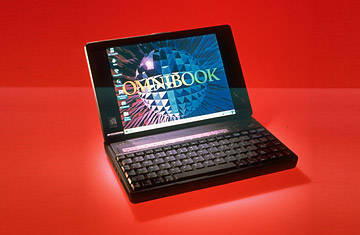
An HP Omnibook, circa 1997. The Omnibook line lasted from 1993 until HP bought Compaq in 2002
(2 of 2)
When Ackman wrote that, the iPad wasn't even a gleam in Steve Jobs' eye. But the PC industry's fierce competition and razor-thin margins made it a long, hard slog of a business, just as it is today. CEO Apotheker, a veteran of big-business software company SAP, wants to refocus HP on profitable products and services for large companies. If he'd been running the joint a decade ago, odds are pretty good that he would have wanted to dump PCs then. (I'll bet that more than one Wall Street type responded to his announcement not with a "You're kidding!" but with an "It's about time!")
So PCs aren't dead, and HP's move away from them may not be as significant as it looks at first blush. That doesn't mean the status quo is going to remain the status quo. Something is obviously happening: nearly every week, I stumble upon a new small business that has woven the iPad into its everyday work, much as companies glommed onto PCs when they were new. But if you think that the PC is starting to give way to something that isn't a PC, you're not thinking big enough.
Desktops and laptops running Microsoft software have dominated the PC market for so long that our brains have lazily conflated that particular platform with the overarching concept of the personal computer. But tablets and smart phones are deeply personal, and they're undeniably computing devices. They're exciting new types of PCs in my book — not entirely unrecognizable beasts, and not the mere PC companions that Microsoft's Shaw described. I look forward to them coexisting with the more familiar sort of PCs for a long time to come.
Maybe "commingling" is a better word than "coexisting." For one thing, Windows 8, which Microsoft plans to officially unveil this month at its BUILD conference, is the first version of Windows that will show the influence of the iPad.
To me, the most important part of HP's decision isn't that the company concluded that its PC business might be better off as a stand-alone enterprise. It's that it gave up on the TouchPad in so little time that the whole effort left me feeling embarrassed for one of Silicon Valley's most iconic institutions. (After finding a ready market for $499 TouchPads marked down to $99, HP is now saying that its tablet isn't absolutely, positively dead, but let's face it: it's more zombie than viable product.)
HP's TouchPad surrender reminds me of the sad story of the minicomputer companies that lined Boston's Route 128 in the 1970s and '80s, such as Data General, Digital, Prime and Wang. They all tried making PCs. They all failed, even after giving the idea far more of a chance than HP gave its tablet. And they all died.
I'm not predicting the collapse of HP's PC business. But by pulling the rug out from under the TouchPad so quickly, the company has declared that it's not even going to try to be a major player in shaping the future of personal computing. That's sad for HP and sad for the PC. And in time, I believe the company will conclude that it made a doozy of a mistake.
McCracken blogs about personal technology at Technologizer, which he founded in 2008 after nearly two decades as a tech journalist; on Twitter, he's @harrymccracken. His column, also called Technologizer, appears every Thursday on TIME.com.
